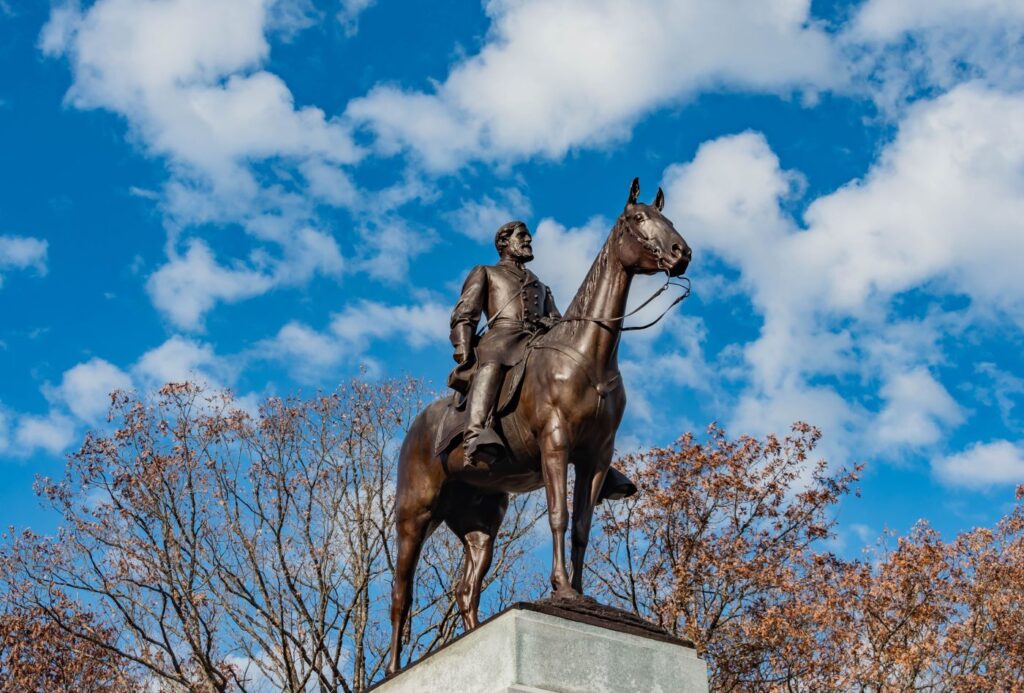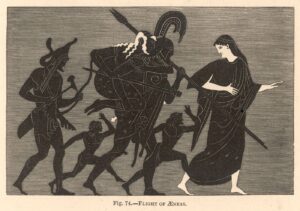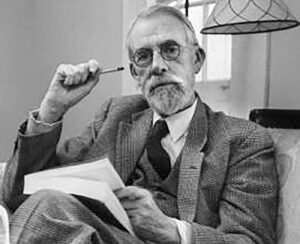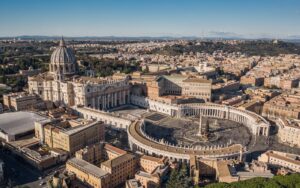As Allen Guelzo recalls at the end of Robert E. Lee: A Life, when the former commander of the rebel southern armies died five years after the Civil War’s end, he was mourned, surprisingly, on both sides of the Mason-Dixon line. Southerners called Lee “one of the noblest soldiers who have ever drawn a sword in a cause which they believed just.” Philadelphia’s Evening Telegraph spoke of many Northerners’ “general disposition to dwell upon his personal virtues rather than to follow him to the grave with denunciations.”
Others reacted very differently. Frederick Douglass said, as Guelzo quotes, that “‘if Lee has gone to heaven we are sincerely glad of it,’ but he did so in spite of ‘the liberation of four millions of slaves and their elevation to manhood.’” One could not ignore that Lee had joined, and greatly enabled, a cause that Ulysses S. Grant called “one of the worst for which a people ever fought, and one for which there was the least excuse”: the maintenance and extension of a system of chattel slavery, predicated on the notion—radically contrary to the principles of America’s Declaration of Independence—that certain classes of human beings were by nature inferior to others.
Douglass and Grant give good reasons to conclude (as many have) that public tributes to Lee are a disservice to the American republic and humanity. Yet many continue to lament the recent removals of his monuments. Some are rebuilding them, or reestablishing other memorials to him and other figures of the Confederacy. Many say that, for all his flaws, he was still a heroic figure.
Americans continue to struggle to understand Lee’s legacy. To that end, then, we might do well to consult accounts of his life like Guelzo’s, that astutely present its moral lessons in all their complexity.
Start your day with Public Discourse
Sign up and get our daily essays sent straight to your inbox.A Man of Devotion
Defenders of Robert E. Lee might argue that his life was in certain respects admirable. After all, as Guelzo recalls, it began in great suffering. Lee was the youngest son of the Revolutionary War hero Henry “Lighthorse Harry” Lee, who abandoned his wife and children in northern Virginia when Robert was very young, eventually dying in Georgia. Henry left his family penniless, forcing them to give up their ancestral estate and move into a Washington, D.C. townhouse. As his older brothers moved out, Robert became his mother’s devoted and sole caretaker.
Although Robert Lee’s family was historically wealthy, he eschewed the prodigality of his aristocratic forebears. He matriculated at West Point to join the army, but entered the Corps of Engineers, where he spent most of his life building forts rather than preparing for war. This stable livelihood helped him provide for his wife and their seven children, to whom he showed much devotion.
This son of Virginia also had a deep love for the United States. He married the adoptive great-granddaughter of George Washington, whose family was strongly pro-Union. Before the Civil War, many Americans (it is said) had more attachment to their town and state than their nation, but not Lee. As late as Independence Day of 1856, when the ire between slave and free states was mounting, Lee could say that “my feelings for my country [are] as ardent, my faith in her future as true, & my hopes for her advancement as unabated” as ever. When Southern states started discussing secession, Lee was incredulous: “God in his mercy forbid” it should happen, he wrote to his son: “Secession is nothing but revolution,” the consequence of a selfish blindness to the common good that undermined good government. Lee wanted “to live under no other government” and to have “no other flag than the ‘Star Spangled Banner.’” He also rejected the argument of the “cotton states” that slavery was a “positive good”; he called it “a moral & political evil.”
A Man of Marble
Many critics of Lee respond that these good qualities would magnify rather than forgive the evil of his decision to turn against the Union. But Guelzo’s critique is more subtle: Lee’s flaw was that his good qualities were only superficial, not real virtues. He called slavery “evil,” but he never said more, nor was he an abolitionist. Although he never owned slaves, he became executor of his father-in-law’s estate after his death, willingly taking charge of its enslaved population. These people were to be freed within five years, according to the dead man’s will. But when the difficulty of the task wore on Lee, and three slaves tried to escape, in frustration he ordered them to be whipped—with exceptional violence—then sold farther south, never to see their families again.
Lee strove to be responsible, but probably more out of shame for his irresponsible father than from devotion to the good. He aimed for “perfection,” as Guelzo says, and fell into perfectionism—achieving the appearance of virtue rather than its substance. This faux nobility of character was reflected in the unapproachable, statuesque coldness of his manner, unintentionally implied in the epithet “the marble man” that contemporary admirers gave him.
Lee was also not especially religious. He was not confirmed in the Episcopal Church until age forty-six, when his young daughters were. He sat on vestries of Episcopalian parishes, but he rarely spoke of God, except amid the exceptionally fearsome dangers of the war. When he became president of Washington (later Washington and Lee) College, he built a chapel for it, but did not appoint a chaplain; he also limited public religious activity to occasional, closely monitored prayer meetings.
All told, it is hard to pinpoint any moral principle that guided Lee’s life. Unless, that is, one counts the closest to an endorsement of principle he ever articulated, when he condensed Washington College’s code of conduct into a single line: “Every student must be a gentleman.”
Yet this motto precisely shows how hollow Lee’s principles were: because as John Henry Newman, a contemporary of Lee’s, pointed out, merely to be a gentleman falls short of moral uprightness.
A gentleman, Newman says, has “a liberal and generous character,” but seeks “honour,” not truth and goodness. For him, vice is merely “unworthy, despicable, and odious,” not sinful, and virtue is only “good taste” and social propriety. This attitude is suggested in Lee’s speech to his troops after their defeat at Gettysburg. “We have sinned,” he said, by a “vengeful, haughty, and boastful spirit,” not an objective misdeed but mere bad manners.
The gentleman, Newman continues, is not he who benefits others, but he “who never inflicts pain;” he is “mainly occupied in merely removing the obstacles which hinder the free and unembarrassed action of those about him.” Lee showed this trait when the crisis of war arrived. He decided which side to take based not on what justice dictated, but on what would be most convenient to his family: he chose to prevent the loss of their properties in northern Virginia to a hostile Confederate government (though ironically the Union armies quickly confiscated many of them to form a barrier around Washington, D.C.), and to protect their reputation among their Virginia kinsmen. Lee said that he retained strong feelings of “devotion to the Union, and . . . [of the] loyalty and duty of an American citizen,” but he worried that his children “will be ruined if they do not go with their State.” A truly good man would have recognized that worldly ruin would have been a small price to pay for avoiding the moral ruin that Lee’s family underwent.
The Riptide of Rebellion
It is well to strive to be a gentleman, but it is better to be good also, anchored in moral substance, and Robert E. Lee’s moral principles were weak. When the flood of war came, he compromised with evil, then piled sin upon sin, as the rebellion’s corrupting logic swept away more and more of his moral foundations.
Having been generally averse to slavery, Lee became inured to it. When the Union Army invaded Fredericksburg, he complained that “these people delight to destroy the weak, and those who can make no defence”; and “it never occurred to him,” Guelzo notes, “that Fredericksburg’s enslaved population might look on the arrival of the Union Army in a very different light.” After the war, he opposed the violent mistreatment of black people, but he would not allow them to be admitted to Washington College. Testifying before a group of congressmen, he said of black people that “I think it would be better for Virginia if she could get rid of them.”
Before the war, Lee clearly recognized that the logic of secession would lead to dysfunctional government. During the war he complained that the Confederate states’ excessive concern for their own interests kept them from committing materiel and manpower to their common army. Even after surrendering at Appomattox, Lee told the Confederacy’s president, Jefferson Davis, that the cause of the South’s defeat was not the superior resources of the North, nor any Northern bullying at the negotiations of surrender (the conditional surrender that Grant proposed was, Lee said, “the best under all the circumstances by which we were surrounded”), but poor discipline and morale in the Confederate troops owing to the whole Confederacy’s lack of will.
But later in life, Lee succumbed to the myth of the “Lost Cause.” This narrative, which today lives on in places, portrayed the Confederate armies, in Guelzo’s words,
as a dauntless band of heroes whose resistance had simply been ground down by Yankee numbers, Yankee bullets, Yankee capitalism, and Yankee rations. . . . [T]he war had been an unfair fight from the start, and nothing had been proven by the Confederate defeat except that unfairness. Slavery, the states’ rights braggadocio, secession—all of these ducked out of view.
Contradicting his earlier statements, an older, bitter Lee said, “it will be difficult to get the world to understand the odds against which we fought”; “all that the South has ever desired . . . was that the Union, as established by our forefathers, should be preserved, and that the government as originally organized should be administered in purity and truth.”
An Ordinary, Commonplace Man
We cannot excuse Lee’s crimes, but we can try to understand what predisposed him to them. Guelzo suggests Lee’s moral weakness began in his dysfunctional upbringing. Though he had great advantages, such as freedom, an aristocratic pedigree, and marriage into wealth, these were heavily outweighed by the fact that “Lee never had a father he could look to as a model for a God who safely directed even the fall of the sparrow.” Left to his own wits, Lee built up habits based on sentiment more than truth; and at the moment of moral crisis, he did not know how to abandon himself to God’s will rather than cooperate in an unjustifiable defense of racial oppression.
Lee’s greatest detractors call him a demon and his supporters call him a hero. But the truth is he was not much different from the rest of us. He was, as the Reconstruction mayor of New Orleans said, “a very ordinary, commonplace man,” with vices like our own, who made bad choices. Had we been in his place, would we have acted better? Many people today seem to think that they would, and their confidence reveals a lack of self-knowledge. Human freedom means that each of us, even if he has made good choices throughout life, is capable of committing the worst atrocities. We should strive with all our strength to live justly and not commit wrong; but if we forget that we, too, are capable of the evils committed by the greatest villains of history—evils that we rightly condemn—we increase the risk of one day committing them ourselves.
Guelzo’s account invites us not to overlook Robert E. Lee’s sins, nor to congratulate ourselves for having avoided them, but to take warning from them. We must form our consciences and hearts in truth, so that we make the right decisions in times of crisis. We must put the moral education of our family above their material comfort. And rather than complacently compare ourselves favorably to evildoers, we must examine whether we ourselves are living according to justice, and not merely concern for what others think of us.
Image by Walt and licensed via Adobe Stock.














